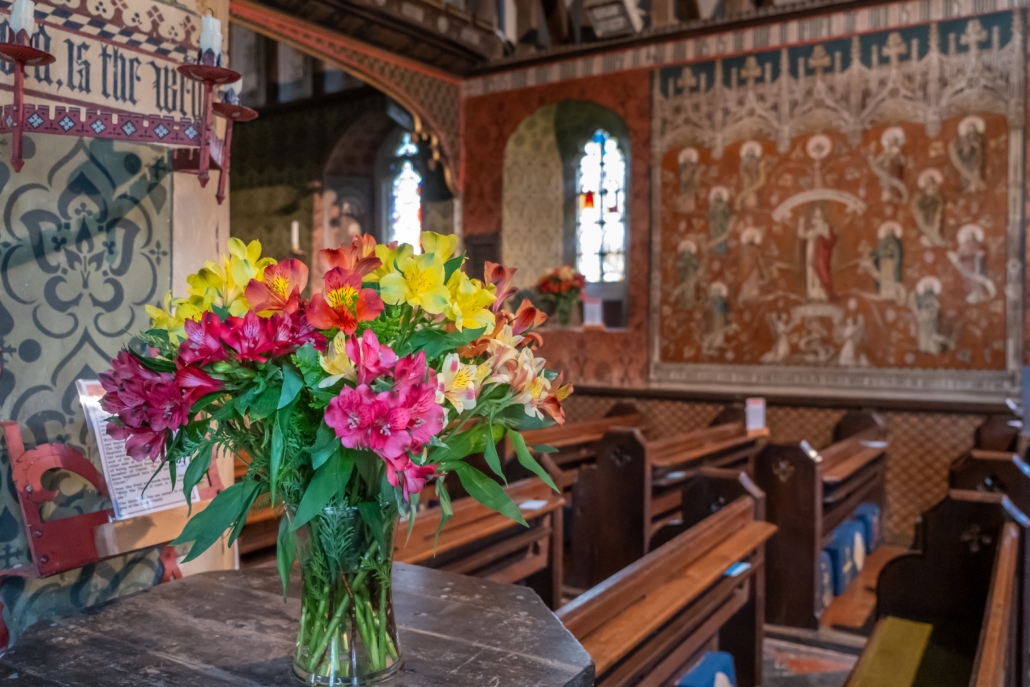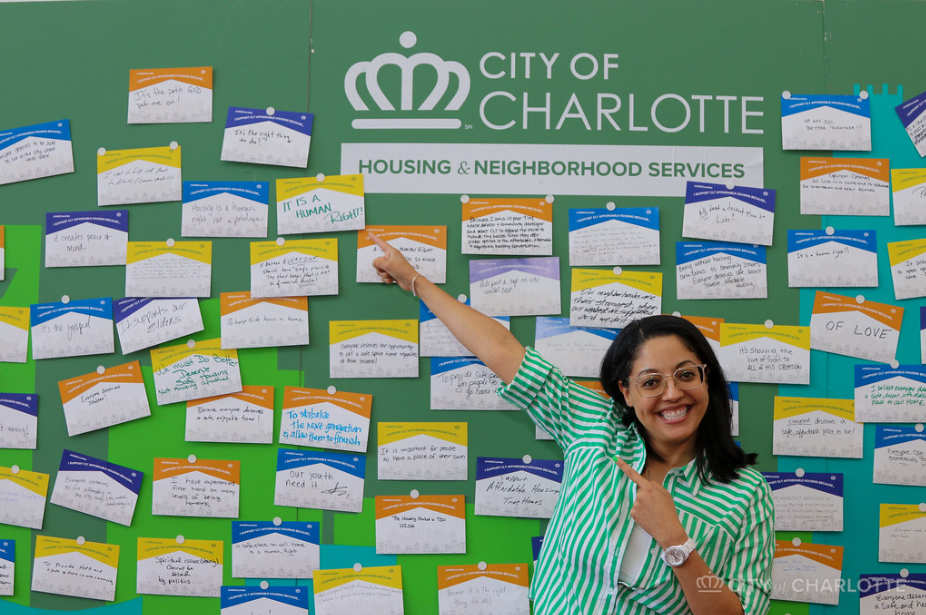Mobilizing Faith-Based Development Initiatives to Address the Affordable Housing Crisis:
A Look at Charlotte-Mecklenburg
Mary Ann Priester
Senior Management Analyst
Mecklenburg County Community Support Services
Liz Ward
Affordable Housing Advisor
Give Impact
Faith-based development initiatives are an emerging promising practice to facilitate the growth of a community’s affordable housing stock. These efforts can help address the current affordable housing crisis while also providing mutually beneficial community development outcomes. Find out below how the City of Charlotte is taking action. Their initiative aligns strongly with Mecklenburg County’s strategic objective to expand affordable housing and reflects our commitment to innovative, community-led solutions.
This blog provides an overview of how faith-based organizations (FBOs) are engaging in housing solutions, and what is being done locally in Charlotte-Mecklenburg to help these FBOs to increase their readiness to engage.
WHAT ARE FAITH-BASED DEVELOPMENT INITIATIVES?
Across the country, faith-based organizations have begun to play a pivotal role in addressing the affordable housing shortages within their local communities. Their efforts can often be classified into four major categories: land, buildings, capital, and people.
- Land: Faith-based organizations often possess land assets that can be leveraged for the development of affordable housing. The land can be contributed to the project in several ways: 1) ground lease (church retains long term ownership), 2) sale (transfer of fee-simple title) or 3) joint venture (often via the creation of a CDC, which is a Community Development Corporation). In any of these methods, the terms can be at market value or discounted, depending on the needs of the church and the ability of the proposed development to pay. Affordability requirements can be implemented via a deed restriction implemented prior to land transfer, or through terms of a ground lease or development agreement.
- Buildings: Faith-based organizations can also utilize their existing buildings to support the creation of affordable housing (or other needed community services, such as non-profit programming space or Early Childhood Education services. They can do this by converting underutilized buildings into affordable housing through adaptive reuse. FBOs can also partner with non-profits, developers, or local community land trusts to lease space at a reduced rate to enable affordable housing development or partner with these entities on collaborative housing projects that convert existing space into affordable housing. Rehab and Adaptive-ReUse can be expensive, so it’s important to ensure the team includes those experienced in this type of work.
- Capital: There are numerous ways that FBOs can use their capital to support the creation of affordable housing. Sometimes an FBO will have capital to contribute to a project that is being developed on their campus, and sometimes it will come from an FBO that is just wanting to support an initiative that is in alignment with their mission areas. Its important for the FBO to determine if they are willing/able to make a permanent grant, or if they want the ability to be repaid and recycle the money in the future. Often, this depends on the level of affordability of project they are seeking to support and the amount of capital the FBO has available (e.g. loans are more complicated and require documentation, so only makes sense for larger capital contributions). Donations to non-profit housing organizations are most common and can go towards many uses, such as 1) restricted contributions to support construction costs, 2) unrestricted contributions to help with operations and pursuit costs, 3) rental subsidy programs, or 4) down-payment assistance programs FBOs can be critical catalysts for projects, by providing initial seed funding or being the first to support an important project. The good news is that Charlotte has local FBOs who have experience doing ALL of these types of capital contributions!
- People: Due to their diverse social networks of congregants and ties to the community, FBOs are uniquely situated to mobilize people to facilitate and support the development of affordable housing. These efforts often include community education through workshops, seminars, and guest speakers to raise awareness about the root causes of the housing crisis and what is needed to address it. They can spearhead advocacy campaigns that support policies that can increase local affordable housing stock. FBOs can also organize funding and resource mobilization events, provide volunteer support for construction and supportive services, and build partnerships with the broader community to help maximize impact. FBOs also use their buildings and campuses to create opportunities for widespread community benefit, such as providing childcare, non-profit office space and community gathering spaces.
FAITH-BASED DEVELOPMENT INITIATIVES AND CHARLOTTE-MECKLENBURG
The following section provides examples of faith-based development initiatives in Charlotte-Mecklenburg. It is important to note that the lists of examples here are not exhaustive. Faith communities across the Charlotte region have mobilized to make a significant impact in addressing the local affordable housing crisis.
Land
The Little Rock AME Zion Church contributed land to the Little Rock Community Development Corporation which was combined with a land donation from the City of Charlotte to develop a mixed-income apartment community in partnership with Laurel Street and the City of Charlotte. In addition, the church is also participating in a shared parking agreement which decreased the amount of parking that needed to be built as part of the development. On March 26, 2024, a ribbon-cutting ceremony celebrated the opening of Varick on 7th, a 105-unit complex on the Little Rock campus that has 52 units designated for households that will not have to pay more than 30% of their income toward housing. Spearheaded by Dr. Dwayne A. Walker, the complex is the culmination of a six-year collaborative effort that has resulted in an increase in the availability of affordable housing in Uptown Charlotte.
In addition, Mayfield Memorial Missionary Baptist Church has ground leased land for the Mayfield at Sugaree apartments, St. Paul Baptist Church ground leased land for Centra Square apartments, and The Park Church contributed land for the Gilfield Senior apartments.
Buildings
In March 2024, Caldwell Presbyterian Church began converting an unused church building into 21 units of supportive housing that will be known as “Easter’s Home”. The studio apartments will serve very low-income households (those making between 30%-50% AMI) and people who are exiting homelessness. Residents of the apartments will not have to pay more than 30% of their income toward rent and Roof Above will provide supportive services to residents once they are moved in. The project, which has a 6-million-dollar budget is being funded with grants from Mecklenburg County, the City of Charlotte, the North Carolina Housing Finance Agency, the Mercanas Foundation, and a 1-million-dollar donation from Myer Park United Methodist Church. The property is expected to open in early 2025.
Capital
As part of its 2018 capital campaign, Covenant Presbyterian Church provided a 2-million-dollar low interest loan to DreamKey partners to support the development of The Mezzanine at Freedom Drive, a 185-unit mixed income apartment complex in West Charlotte. The property serves residents earning 30%, 50%, 60% and 80% AMI as well as market rate units. The Mezzanine at Freedom opened in 2020 and Covenant Presbyterian has been able to provide ongoing engagement with community residents.
Another example of faith communities providing capital to support affordable housing is the partnership between Myers Park Presbyterian, Antioch Missionary Baptist Church, and Grier Heights Presbyterian Church. Together with Crossroads Corporation for Affordable Housing and Community Development, these faith communities partnered together to provide capital to acquire land for future affordable housing development in Grier Heights. Together they provided a $910,000 interest-free loan to acquire a parcel of land that will be developed into multi-family affordable housing.
People
Shiloh Baptist is leasing 8,000 square feet to DoGreater Charlotte, a non-profit who is providing creative space, training programs and even co-working for youth and adults. The Plaza Presbyterian campus is now being turned into a new regional hub for local non-profit Arts+, which will include music education programming space, a cultural arts center and non-profit office space. And most recently, Myers Park United Methodist opened a community-focused coffee shop called Higher Grounds that will providing job & training opportunities and will reinvest profits into the community.
WHAT IS BEING DONE LOCALLY?
In January of 2024, Mayor Vi Lyles formally launched a Faith-Based Development Initiative that is being championed by City Council Representative LaWana Mayfield. It started with a full-day Summit in May and now the City is rolling out a series of opportunities for engagement with the support of the Housing & Neighborhood Services department, the team from Give Impact and other local experts.
FAITH IN HOUSING SUMMIT
In May 2024, the City of Charlotte hosted the Faith and Housing Summit which convened over 300 individuals, 200 organizations, and 95 faith communities to explore ways that faith leaders, government entities, community members, housing experts, community organizations and policymakers can partner to address the affordable housing crisis in Charlotte. The summit sought to raise awareness of the affordable housing crisis in Charlotte, mobilize the faith community, foster collaboration, share best practices, and highlight policy changes that could increase the amount of affordable housing in Charlotte. This first of its kind event helped lay the groundwork for enhancing existing efforts and enhancing collaboration between the faith community and other stakeholders in Charlotte’s collective response to the local affordable housing crisis.
COMING SOON FROM THE CITY OF CHARLOTTE FAITH IN HOUSING INTIATIVE
The City of Charlotte is rolling out new initiatives to increase connectivity, education, and empowerment among FBOs desiring to make a difference in the local housing needs.
Here are some actions you can take to stay connected:
- Sign-Up to be on the City’s Faith in Housing email list: here.
- Sign-Up to be listed in the City’s Faith in Housing directory: here.
- Watch the first Lunch & Learn Series on Affordable Housing Basics & Charlotte’s Housing Trust Fund 101: here.
- Engage in the new LinkedIn Group started by Give Impact labeled “Faith and Housing Carolinas”: join here.
In addition, a new line-up of opportunities to engage and provide input are coming this Fall. Registration links will be posted on the Faith in Housing website.
- Request for Proposals (RFP) for Professional Services: If you are an FBO, you can provide input on the draft that is posted on the website before it launches. The intent is for this RFP is to help the City identify a list of qualified professionals that can provide services and guidance to Faith Based Organizations seeking to pursue housing development on their land (target is to begin offering services in early 2026).
- Lunch & Learns 2 and 3: Land Development 101 (October 10, 15) and Choosing Development Partners (October 24, 29).
- Flash Advising Event for FBOs & Design Professionals: (November) Limited Capacity, FBOs Must Apply to Participate.
- Networking Event for FBOs and Housing Providers: (Winter 2025) Date TBA.
SO WHY DOES THIS MATTER?
By leveraging their broad spectrum of assets, many faith-based organizations have the capacity to support community efforts to address the local affordable housing crisis. Faith-based development initiatives are an emergent promising practice that provides innovative and sustainable solutions that have the potential to benefit all of Charlotte-Mecklenburg. By leveraging their assets—land, buildings, capital, and people—faith-based organizations are making a significant impact in addressing the affordable housing crisis and supporting vulnerable populations. As faith-based development initiatives continue to evolve, Charlotte-Mecklenburg can serve as a model for how faith communities can partner with government entities, community members, housing experts, community organizations, and policymakers to solve the local affordable housing crisis.
Stay connected by signing up on the City’s Faith in Housing website and by joining the new Faith & Housing Carolina’s group.
Liz Ward is a local Charlotte native and elder at Covenant Presbyterian. She founded Give Impact Advisory Services in 2020 to help increase momentum for Charlotte’s housing stock and has helped several Faith Based Organizations deploy capital, evaluate land use, repurpose buildings and educate their congregation.



